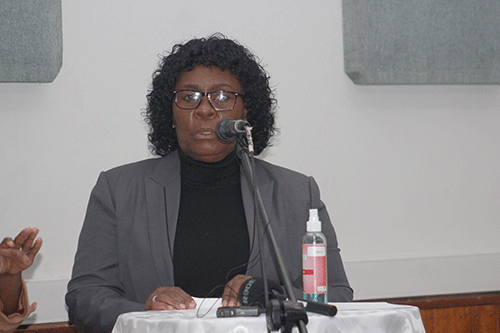RUNDU – Education minister Anna Nghipondoka insists the new curriculum is a positive development but agrees its implementation and guidance of learners are challenges that need attention.
With the revised education curriculum, the junior primary phase will be from grade one to three, while the senior primary phase will be from grade four to seven.
The junior secondary phase includes grades eight and nine and will require learners to write junior secondary semi-external examinations at the end of grade nine.
Grade 11 has become the first exit point from basic education and learners who do well in grade 11 may go ahead to grade 12, which is referred to as the Advanced Subsidiary (AS) level, which has been implemented from 2021 as part of the third basic education curriculum change that started in 2012.
“Last year, there was noise across the country that children graduate on the streets because of the bad curriculum. The curriculum is not bad,’’ said Nghipondoka, at the official handover of the renovated and infrastructure improved Linus Shashipapo Secondary School in Kavango East last week.
The minister told the audience at Linus Shashipapo that the implementation of the curriculum seems to be the issue.
“Either you don’t have enough resources and you are not innovative or we do not do what we are supposed to do for the curriculum to be understood and for the parents to understand that grade 11 is the first exit point or grade for this learner to already go to university if they so wish,’’ she told the teachers.
She said the ministry identified many schools in the region to offer AS for every child who wish to go to grade 12.
Nghipondoka said the ministry recalled the old curriculum to give all learners who wish to do high level subjects and are capable to go through to the AS level the opportunity to do so. She reiterated that the old curriculum excluded some learners from accessing the high level.
“Because before (in the past) we did it parallel from grade 10, where some learners were having high level while some were having ordinary or a child has a combination of both. Some subjects on high and some on ordinary level and it was a confusion, some schools never had high level,” she noted.
“So, when you study now, for your upcoming examination, do it either with a focus to go out already at grade 11 and go to varsity or to go to AS. It is not a sin for all children who are in grade 11 in this school to go to AS if they meet the requirements. Onawa did it last year, 100% grade 11s went to AS and nobody said you can’t,” she said.
Nghipondoka argued, to execute the new curriculum properly, all subject teachers need to give learners career guidance.
“We have children who are in grade 11 and they did not apply to any university and they don’t even know what they are going to study. Every teacher must be a guidance teacher. How can you teach biology and you cannot put down the book and say if you study biology, physics and chemistry what are the fields of studies that you are preparing for and also look at the attitudes and capabilities and guide the learners? If it is not done these children are going to graduate on the streets,” she noted.
Nghipondoka said if teachers give career guidance to learners, they would be motivated and focused.


